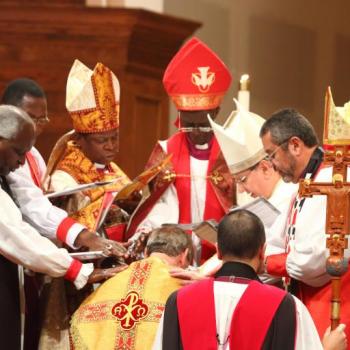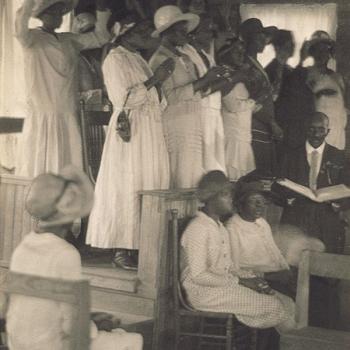The opera may be over when the fat lady sings, but for denominations it’s time to meet for national assemblies when the NBA and NHL reach the final round of playoffs. The United Methodists made lots of news recently over their votes on gay marriage and abortion — votes which may have inappropriately preceded the Warriors and Cavaliers series. But lots of other denominations are gathering to deliberate church business — reports from missionaries, spread sheets on revenues and expenses, elections and appointments of officers.
This post comes from the General Assembly of the Orthodox Presbyterian Church, a small denomination (just a little over 30,000 members), which is convening at Sandy Cove conference center in North East, Maryland. That size indicates that Protestants in North America are not flocking to the OPC. Why would they? The OPC is narrowly — some would say obnoxiously — Calvinistic and takes its Presbyterian procedures seriously. Outsiders may think the Presbyterianism is obsessive. But it goes back to the founder, J. Gresham Machen, and his experience with administrative structures in the Presbyterian Church U.S.A. that were at times less than flexible or transparent. The OPC’s brand, such as it is, is not user friendly the way that IBM’s used to be or that Apple’s now is.
Even so, the large denominations do not have the appeal that they used to. Many American Christians know as little about the United Methodist Church as they do about the OPC (even though the latter is microscopic compared to the roughly 6 million-member UMC). Lots of Protestants in North America are comfortable with worshiping and belonging to congregations that have no ecclesiastical connections — we call them independents. The logic seems to be that everything you need from a church — worship, counsel, fellowship — happens locally. The flip side is that what happens at synods and assemblies is remote and of little relevance to the local congregation.
But what if we thought about churches the way we think about the United States? What if Michigan and Illinois were their own sovereign nations, not part of the United States? Imagine all the work that state officials in Lansing and Springfield would have to do that federal agencies already do. Think especially about matters like defense and international relations. Would Michigan and Illinois have to mount their own armies (and navies thanks to the Great Lakes)? Could they even defend themselves against an invasion by Canada, say the Canadians wanted to exclude U.S. hockey franchises from the NHL and so insure that Detroit and Chicago remain in the league? And would the citizens of Michigan and Illinois pay the taxes to support embassies around the world? Or would they seek membership in the United States where the federal government takes responsibility for such activities?
As poor as analogizing the spiritual work of churches to the civil tasks of nation-states, it may illustrate the practical advantages that come to congregations that belong to denominations. Without a denomination that defends its members from outsiders by imposing standards for theological education of ministers and church membership, a congregation has to figure out its identity on its own (and from pastor to pastor). So too, a congregation has almost no capacity for ecumenism (foreign relations). One of the striking aspects of the OPC’s General Assembly is the presence of fraternal delegates from churches in South America, Africa, Asia, Australia, and Europe. Even then, our denomination does not have the resources to conduct ecumenical relations with churches in other parts of the world that would like to have ecclesiastical ties to the OPC. I don’t care how big the megachurch, its efforts to carry on the work of a denomination would be akin to Michigan replicating the work of the United States.
The irony is that many Americans think of denominations as parochial or partisan. Methodists only hang out with Methodists, Orthodox Presbyterians only with Orthodox Presbyterians. But denominations are remarkably cosmopolitan and ecumenical compared to the average congregation. In fact, the greatest example of sectarianism ecclesiastical myopia may be the independent congregation.












